The candidate in his crisp white shirt reeled off his three priorities to the crowd of voters crammed into a bar: to boost police numbers for public security, take tough action on drugs and slash the red tape frustrating businesses.
These are familiar themes from many political contests. But this tough-on-crime speaker was not a rabble-rouser in a conservative state, but an earnest Democrat who has stormed into the lead in the fight to run America’s most progressive city.
“We gotta get our house in order,” said Daniel Lurie, wealthy heir to the Levi Strauss fortune and stakeholder in Leeds United, as he attacked the stifling bureaucracy, corruption and fear of crime that torments the streets of San Francisco.
It felt a long way from that recent spate of talk on the US left about defunding police as I watched people in The Liberties bar loudly applaud a Democrat politician after he demanded the hiring of 500 more officers and unleashing of a war on drugs.
“We lost control of our streets – there is a sense of disorder that we need to improve upon, no question,” Lurie told me afterwards. “We had an elected class that forgot it’s their responsibility to take care of people. We have to have common sense.”
A mayoral battle in a Californian city of 800,000 people might seem inconsequential compared with the fight to become president in the world’s most powerful nation.
Yet this is Kamala Harris’s home turf, the place where she became district attorney, starting her rise in politics that has taken her to the brink of the presidency. So San Francisco is used by Donald Trump and his allies as a weapon to target Harris, portraying her as a hard-line leftist who typifies the failed regime that wrecked a world-famous city.
Homeless people collect personal items as city workers remove an encampment in the Bayview neighbourhood in San Francisco (Photo: David Paul Morris/Bloomberg via Getty Images)
“She destroyed San Francisco, absolutely destroyed it,” said Trump recently. “You can’t go into San Francisco. It’s not liveable. Fifteen years ago, it was the best city in the country, one of the best cities in the world, and now you can’t do anything.”
One prominent local resident was given a key platform at the Republican Party’s convention to cement such ties. “In my hometown of San Francisco, Democrat rule has turned the streets of our beautiful city into a cesspool of crime, homeless encampments and open drug use,” said the billionaire tech investor David Sacks.
Yet he was not wrong – and the mess that the Democrats have made running this rich and famous city is an Achilles heel for Harris (even if Trump’s rant blaming her for all its woes is undermined by the fact that she was the district attorney 15 years ago).
I was shocked visiting just before the first pandemic lockdown and seeing so many addicted, homeless and mentally ill people abandoned to live, deal, defecate, steal and often die in the city centre streets, driving away many businesses and tourists.
And discovering that even shampoo and toothpaste were kept behind locked glass in shops after a state ballot reclassifying property thefts below the value of $950 as misdemeanours backfired, leading to a surge in blatant stealing and shoplifting.
Over following months, San Francisco saw more fatalities from fentanyl than Covid while its leaders squabbled over renaming schools. Squalid scenes of human misery shamed this ultra-wealthy bastion of iconic liberalism.
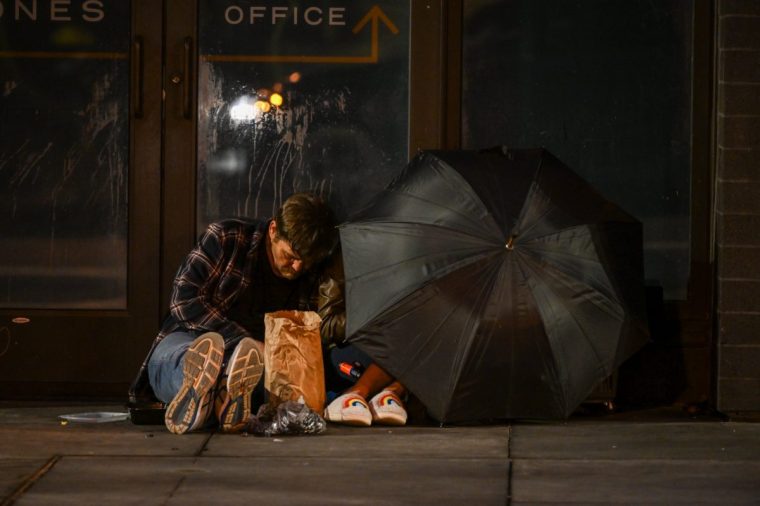 A homeless couple on the streets of San Francisco (Photo: Tayfun Coskun/Anadolu via Getty Images)
A homeless couple on the streets of San Francisco (Photo: Tayfun Coskun/Anadolu via Getty Images)
So while Harris makes much of her record prosecuting miscreants such as Trump, polls show residents feel their city is on the wrong track. Its national image has slid from sun-kissed coastal idyll to a wasteland of drugs, syringes and shuttered shops.
Three front-runners for mayor are standing as tough crime-busters. London Breed, their first black woman mayor who once backed calls to defund the police, says she has learned the hard way that compassion has limits. Another leading candidate is demanding the rapid deportation of drug dealers hailing from Latin America.
The outcome is still hard to predict with a transferable voting system and strong candidate from the left in this Democrat-dominated city where politics has been famously described as “a knife fight in a phone box” due to its internecine brutality.
There is profound irony, however, that the city’s Democrat politicians and many of its voters have shifted right just as San Francisco is held aloft on the national stage once again to demonstrate the dangers of the left.
“San Francisco is an easy villain for the Republicans,” said Jason McDaniel, a political scientist at San Francisco State University, adding that the right had long used the city as a dog-whistle symbol of extreme liberalism in the culture wars.
“They’re not talking about high taxes but about a place where different types of people live – people who are not seen as traditional families, who are very liberal on civil rights, gay rights, trans rights.”
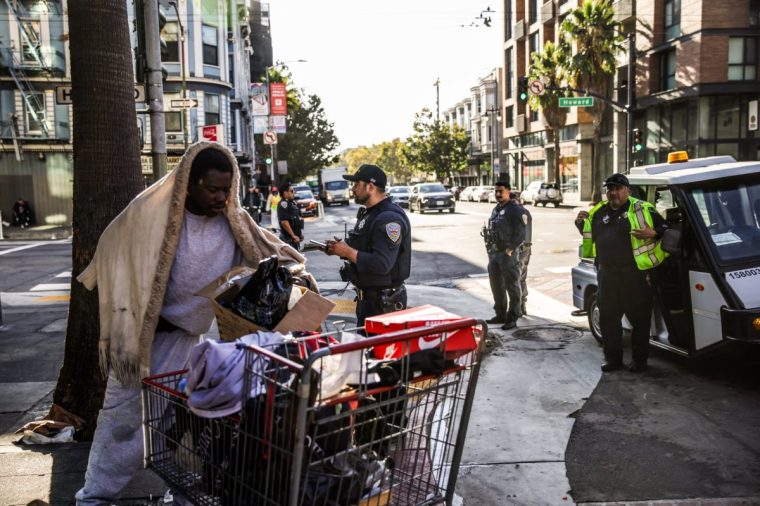 A homeless person prepares to move their belongings during a street sweep in San Francisco (Photo: Gabrielle Lurie/San Francisco Chronicle via Getty Images)
A homeless person prepares to move their belongings during a street sweep in San Francisco (Photo: Gabrielle Lurie/San Francisco Chronicle via Getty Images)
Yet McDaniel admitted the image of San Francisco had changed from “a beautiful, wealthy tech city that was full of innovation into a post-pandemic dystopia”, and that this led many residents to criticise the quality of local government.
San Francisco has 63 billionaires and 285,000 millionaires, a report revealed last year. But it also has the biggest per capita population of homeless people in the nation, some of the highest rents, and a huge number of empty offices – with more than one third vacant.
Steve Hilton, former aide to David Cameron turned Fox News presenter, said it was fair to focus on the city “because for 20 years you have had one-party rule in a city and a state where there is no one else to blame for its problems”.
“The vivid scenes of open drug markets and hundreds of homeless people in tents while the local government seemed to do nothing looked sleazy and hopeless. It was emblematic of all the issues afflicting the state.”
Hilton, founder of a California-focused policy group and rumoured to be standing as a Republican for governor, said it was startling how the state was at the wrong end of almost every national comparison table from highest taxes to worst poverty rates.
Bear in mind that in the US system, states and cities spend far more than the federal government. So this super-rich Californian city is spending almost $16bn this year, giving it a budget four times bigger than Britain’s second-biggest city of Birmingham.
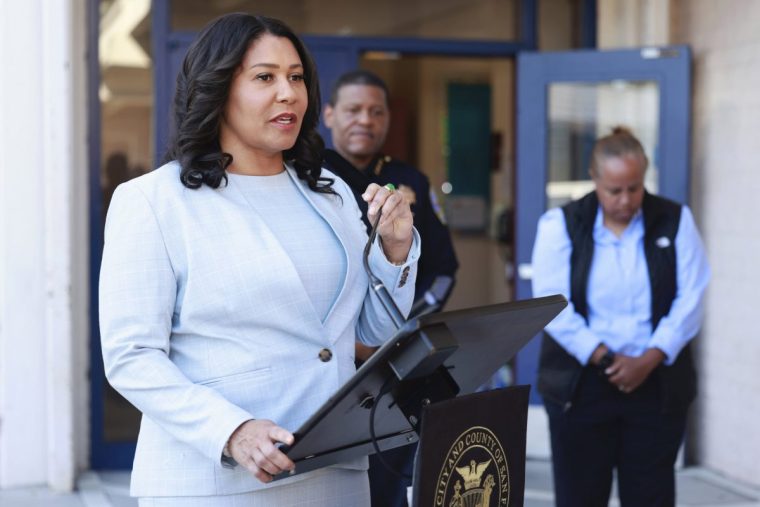 San Francisco Mayor London Breed (Photo: Jessica Christian/San Francisco Chronicle via AP)
San Francisco Mayor London Breed (Photo: Jessica Christian/San Francisco Chronicle via AP)
“This is not a crisis of resources – it is a crisis of leadership,” said Lurie, who set up a prominent local charity to fight poverty. Or as one despairing psychiatrist asked me, where’s all the money gone when we can’t find treatment beds for patients in crisis?
Such arguments are supported by Thomas Wolf, a drug policy activist who lost his job and family after becoming addicted to opioid painkillers following foot surgery, then moved onto cheaper heroin and ended up living homeless in his native city.
He said there had been too much emphasis on harm reduction but not enough on enforcement. “The idea of accountability is the corner-stone of recovery,” he said.
Wolf, a moderate liberal who backs Harris, believes it is fair for the right to criticise San Francisco when it has a £1bn-a-year budget for housing homeless people and tackling substance abuse. “You have to ask how effective they have been – and the answer is not very good.”
Drug overdose fatalities are three times the national rate – although there has been a small drop over the last three months and violent crime rates are comparatively low for a major US city.
Voters began to rebel two years ago by ousting a hard-left successor to Harris as district attorney – whose parents were both militants from an anti-war group jailed for triple murder – and then passing state ballot measures to enforce drug treatment on welfare recipients, and widen police powers.
An attempt to fight back against such reforms went to the Supreme Court, which ruled in June that the city had a right to clear tent encampments. Mayor Breed has since unleashed “aggressive” sweeps of the city centre streets, aided by federal agents, although critics say this simply pushes the problem to less visible areas.
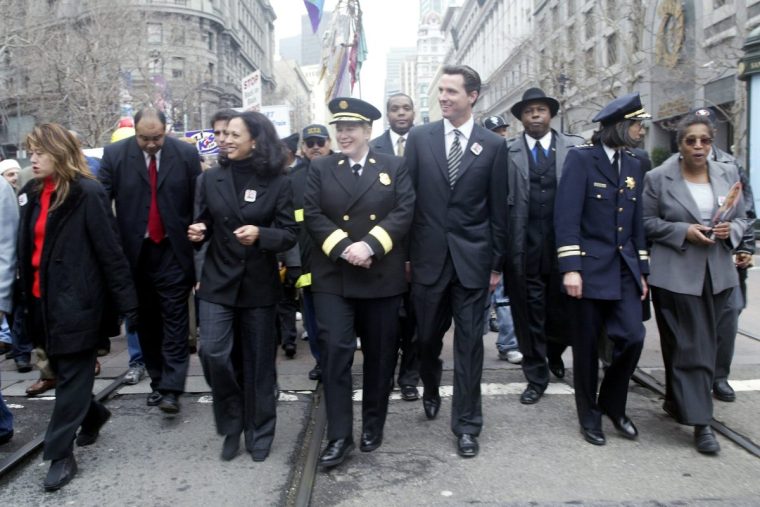 Then district attorney Kamala Harris, third left, with other city officials including then mayor – and current California Governor – Gavin Newsom at the annual Martin Luther King Jr Freedom March in San Francisco in 2004 (Photo: Liz Hafalia/The San Francisco Chronicle via Getty Images)
Then district attorney Kamala Harris, third left, with other city officials including then mayor – and current California Governor – Gavin Newsom at the annual Martin Luther King Jr Freedom March in San Francisco in 2004 (Photo: Liz Hafalia/The San Francisco Chronicle via Getty Images)
The scenes of urban decay combined with high taxes led some prominent tech bros to ditch the Democrats – most notably Elon Musk, who moved X (formerly Twitter) from the city where it was founded and has become a strong Trump supporter.
Other frustrated technology barons and business leaders sought to salvage their city and shift the party back to the centre in tandem with resident groups, leading to moderates sweeping elections for the Democratic central committee this year.
Yet one key figure admitted to me they shared blame for the failed policy initiatives, political naivety and failing to confront vested interests such as public sector unions.
“But San Francisco is the only place in California that gives me hope because of its energy and innovation,” added David Crane, a lecturer in public policy at Stanford University and founder of an influential pressure group called Govern For California.
Another central player in the fight-back was Welsh-born billionaire venture capitalist Sir Michael Moritz, who this month published a powerful column in The New York Times headlined, “The Progressive Politicians Who Failed San Francisco”.
“After decades of unilateral rule, the city is undergoing a seismic shift,” he wrote. “Democrats like me, fed up with the damage wrought by years of preposterous and overly progressive policies, are fighting to take the city back.”
Read Next
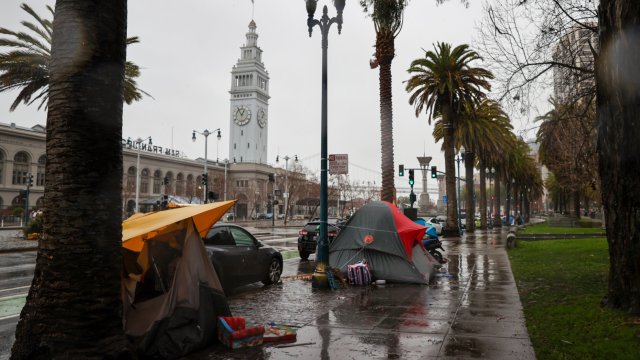
Moritz argued that it was wrong, however, to attack Harris as a San Francisco radical when she was a pragmatist on the centrist wing of the Democrats “who cut her teeth confronting murderers and rapists, and left the city a decade ago.
Harris has flirted with the left, even praising the drive to cut police funding after the Black Lives Matter movement took off at a time when she was seeking to woo progressive activists in her party during her failed 2020 bid for the presidency.
Yet Moritz is right that she made her name in San Francisco on the centrist wing. She launched programmes to help first-time offenders, but also defended the death penalty and defied a Supreme Court order to reduce prison overcrowding after becoming California’s top law enforcement official.
San Francisco has been a punchbag for the right ever since hippies moved into Haight-Ashbury in the 60s, used to attack top Democrats from the state such as former House speaker Nancy Pelosi. After another mayor illegally issued marriage licences to same-sex couples, Republicans used the furore to help re-elect George W Bush.
Yet for all its flaws, it is still the place that is powering both the digital and artificial intelligence revolutions reshaping our world. “The spirit of our city is alive and well and we don’t like how people are talking about us,” said Lurie.
Copyright for syndicated content belongs to the linked Source link



